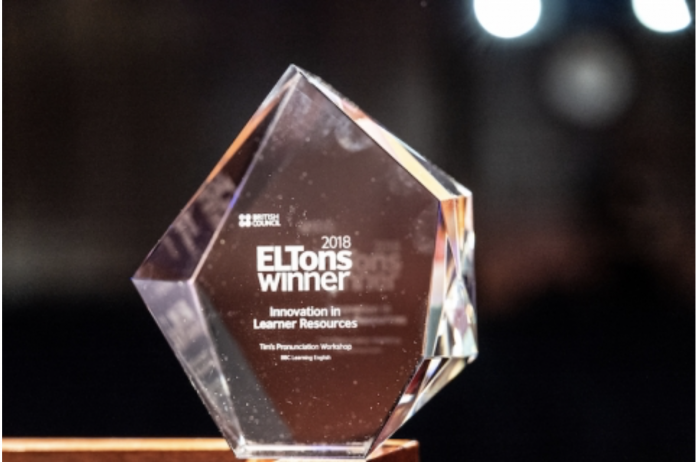The British Council’s ELTons recognise those creating innovations in the field of language teaching. We take a look at those who’ve made it to the 2021 shortlist
Reading the list of finalists for this year’s ELTons, ELT’s very own Oscars, three main trends emerge: digitalisation, inclusion and cross-
border collaboration. With entries from over 20 countries, it’s clear these sectors are global.
In the Digital Innovation category, the entry from the Centre for Inclusive English Language Learning (CIELL) is CIELL- Comics for Inclusive English Language Learning, the result of a collaboration between a UK university, a Greek college
of art and design, a German institute for innovation and a university language centre in Cyprus. Their digitalised offer is “designed to support students with (and without) dyslexia”, according to its creators, by offering “an inclusive, gamified approach” to essay planning.
Apps abound in the shortlist. The Oxford Advanced Learner’s Dictionary is now on an app; primary kids using Pearson’s new English Code get their practice materials on theirs; Peachey Publications has an app for teachers and there’s a homework one for students from LearnCube.
Apps are not the only platforms. BOOKR Class, from Hungary, has a whole library both on an app and in an online classroom version.
Also online is a literacy tool, Fiction Express from Boolino SL, based in Spain and the UK, which involves learners in the writing of the site’s own stories. For those still hankering for a printed book, there is the wonderfully named Escape the classroom from one of two finalists from Perceptia Press UK and Japan.
Digital offerings come in many formats. For online learners there is the online English Pronunciation Course, tailored to fit the student’s native language, from Luke Nicholsons’ Improve Your English Accent website.
On video, we have Days Crossing, a drama series from New Zealand company Chasing Time English, that uses humour and surprises to engage students, and Sensations English, using news-based footage. There’s also Digital Learning Associates’ Vloggers Academy, which features professional YouTubers from Jamaica to Hong Kong.
The range of tools used is wide: audio downloads and workbooks for young learners in CUP’s Fun Skills; Virtual Reality with Immerse Virtual Language Learning Experience from the US and the AI behind the personal feedback on IELTS essays delivered by Australia’s Literatu Scribo.
“Diversity and inclusion is a theme across all categories”
Diversity and inclusion is a theme across all categories. For example, Perceptia Press is on the Course Innovation shortlist for Helping Matters, a programme for Japanese social workers needing English to deal with the country’s foreign residents. Meanwhile, under Student Resources, we find an English course for Paralympic power lifters produced in Germany.
The shortlist for Teacher’s Resources covers a wealth of inclusive materials with Communicating Identities from Routledge, Teacher Wellbeing from OUP and two CUP titles: Teaching in Challenging Circumstances and Engaging Language Learners in Contemporary Classrooms. And lest we exclude very young learners, they’re the subject of Teaching English to Pre-Primary Children from DELTA Publishing.
In the Local Innovation shortlist, inclusion predominates with a Booklet of basic grammar in American Sign Language and pictures for deaf and hard of hearing learners in Oman; and guidance and
resources for Volunteers, English Language Learners and Conversation Club in the UK produced by the Learning and Work Institute with Learning Unlimited and much welcomed by volunteers.
“I am so glad the resources have been converted for online use,” one conversation organiser is quoted as saying, “it’s exactly what we all need.”
Several volunteer projects have made the list of finalists. Former winner The Hands Up project is back in Facebook Live Team Teaching for the Palestinian English Curriculum and there is even a Mosaik Dogme Toolkit for teachers of refugees, produced with Scott Thornbury.
Cultural inclusion is not left out. From Belarus comes Converse Across the Universe: Managing Cross-Cultural Communication by Yelena Golovatch, Margarita Kochan and Yauheni Radzetski, From China we have Talk about China. Produced by OUP China with Jingban Beijing Education, this listening and speaking course blends Chinese culture with a world perspective.
Linguistic inclusion is an important concern in a profession where the student’s mother tongue and the other languages they happen to speak have been banned from the classroom. All students’ languages, including art and social media, is the dominant theme in Our Languages, a course for Brazilian teenagers from StandFor with FTD Educação. Another digital language underlies Pearson’s Code English, which has a STEAM syllabus.
International collaboration is behind Oxford Discover English, produced by OUP teams in the UK, Egypt, Mexico, Turkey, Spain and the Middle East. But our vote for global collaboration goes to the Finnish not-for-profit which launched Link Online Learners, “a diverse and inclusive global network”, with learners and educators in 13 countries, including Australia, Nigeria, North Macedonia and Vietnam.





